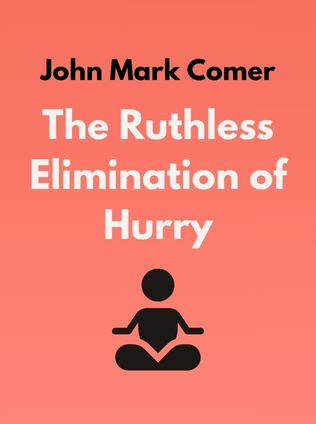
The Ruthless Elimination of Hurry
How to Stay Emotionally Healthy and Spiritually Alive in the Chaos of the Modern World
By John Mark Comer
Published 10/2019
The Ruthless Elimination of Hurry
In today's world, many of us wake up each morning with a sense of urgency already gnawing at us. We rush through our routines—quickly drinking our coffee, skimming the news, and half-listening to a podcast on our way to work. The day is a blur of back-to-back meetings, multitasking, and hurried interactions. By the time we return home, our bodies may be stationary, but our minds are still racing, our hearts heavy with the weight of unmet expectations and unfinished tasks.
This relentless pace isn't just the product of our individual choices; it reflects a broader cultural obsession with speed and productivity. We live in a society that equates busyness with importance, that measures success by how much we can achieve in the shortest amount of time. But what if this way of living is deeply flawed? What if, instead of adding to our lives, this constant hurry is actually robbing us of the very things that make life meaningful?
In his transformative book, The Ruthless Elimination of Hurry, pastor and author John Mark Comer explores these questions. Comer speaks from personal experience, having once been a pastor of a rapidly growing megachurch, caught up in the demands of ministry, family, and life in general. He found himself exhausted, overextended, and spiritually dry—despite being deeply committed to his faith and vocation. The turning point came when he realized that the pace at which he was living was not sustainable and was, in fact, contrary to the life Jesus modeled.
“Hurry is not just a disordered schedule. Hurry is a disordered heart.” – John Mark Comer
Comer argues that the way to escape the tyranny of hurry is not simply by better time management or squeezing more efficiency out of our days. Instead, he advocates for a radical shift in our approach to life—one that is grounded in the ancient, yet ever-relevant practices of Jesus. By adopting a slower, more intentional lifestyle, we can begin to recover our relationships, our health, our spirituality, and our sense of purpose.
The Tyranny of Hurry
Comer begins by diagnosing the root of the problem: "hurry sickness." This term, originally coined by cardiologists in the 1950s, describes a chronic sense of urgency and a constant feeling that there is too much to do and not enough time to do it. It's the condition of being perpetually rushed, of feeling like you're always behind, even when you're not.
Hurry sickness manifests in various ways. It might look like always being in a rush, even when there's no need to be. It could mean multitasking to the point of inefficiency, or feeling guilty when you try to rest. It can show up as irritability when things don't move as quickly as you'd like, or as a constant pressure to be productive, even in your leisure time.
The problem with hurry sickness is that it doesn't just affect our schedules; it affects our souls. When we're constantly hurrying, we become disconnected from ourselves, from others, and from God. We lose our ability to be present, to listen deeply, and to engage meaningfully with the world around us. As Comer puts it, "Hurry is violence on the soul."
“Hurry is the great enemy of spiritual life in our day. You must ruthlessly eliminate hurry from your life.” – John Mark Comer
Comer contrasts two types of busyness: "lively busyness" and "rushed busyness." Lively busyness is when your days are full, but they're filled with activities that bring you joy, meaning, and connection. It's the kind of busyness that leaves you tired at the end of the day, but in a good way—a way that feels fulfilling. Rushed busyness, on the other hand, is when your days are crammed with tasks and obligations that drain your energy and distract you from what truly matters.
He illustrates this distinction with two scenarios. Imagine starting your day by rushing through a shower, grabbing a quick breakfast, and then diving straight into emails and tasks. Lunch is a hurried affair, eaten at your desk while you continue working. After work, you rush home, throw together a quick dinner, and then spend the evening catching up on more work or mindlessly scrolling through social media. By the time you go to bed, you feel exhausted, but also unsatisfied. The day was full, but it wasn't fulfilling.
Sign up for FREE and get access to 1,400+ books summaries.
You May Also Like
The Subtle Art of Not Giving a F*ck
A Counterintuitive Approach to Living a Good Life
By Mark MansonRich Dad Poor Dad
What the Rich Teach Their Kids About Money - That the Poor and Middle Class Do Not!
By Robert T. KiyosakiHow To Win Friends and Influence People
The All-Time Classic Manual Of People Skills
By Dale CarnegieFreakonomics
A Rogue Economist Explores the Hidden Side of Everything
By Steven D. Levitt and Stephen J. Dubner



















